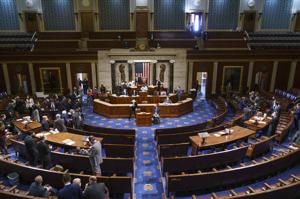Illinois Democrats praise final passage of $1.9 trillion federal spending plan

(The Center Square) – Federal taxpayers are set to send more than $10 billion to Illinois with a measure the U.S. House passed Wednesday.
President Joe Biden is expected to sign the measure.
“Thank you, members of the U.S. Congress and the U.S. Senate, for responding to the needs of America to survive COVID-19,” Illinois Comptroller Susana Mendoza said in a statement. “This financial relief is needed in Illinois to pay back billions of dollars we borrowed from the federal reserve that allowed us to cover the state’s health care bills as we fight our way through this pandemic.”
Mendoza said it is not a “bailout.”
Illinois’ finances have been in dire straights since before the COVID-19 pandemic with unbalanced budgets, billions in backlogged bills and more than $140 billion in unfunded pension liabilities.
The $1.9 trillion federal spending plan is described as COVID-19 relief, though some Republicans in Congress said the measure was nowhere near being a COVID relief package.
“Astonishingly, not even 9% of the $1.9 trillion cost goes towards public health spending to combat COVID-19 such as vaccines, testing, or contact tracing,” said U.S. Rep. Rodney Davis, R-Taylorville when the House initially passed the measure onto the U.S. Senate.
The U.S. Senate changed a few aspects, such as dropping the $15 minimum wage component, before passing it back to the U.S. House.
“We are close to finally putting this pandemic behind us,” U.S. Sen. Dick Durbin said after it passed that chamber last weekend.
Illinois House Speaker Emanuel “Chris” Welch, D-Hillside, on Wednesday praised the passage in the U.S. House.
“The state of Illinois will receive $7.5 billion in assistance and local governments will receive another $6 billion,” Welch said in a statement. “Once guidelines are issued by federal authorities, I look forward to working with the Pritzker administration and our budget leaders on how to best appropriate these funds so they meet the needs of our most vulnerable communities.”
Before the final passage, Gov. J.B. Pritzker’s Office of Management and Budget said it would be reviewing how to use the money coming to the state’s coffers.
“I think most people are interested in the state stabilization dollars, recovery dollars, those we kind of need to wait and see what the funds can be used for,” Pritzker Budget Director Alexis Sturm said during an Illinois House committee Wednesday. “Primarily the expectation is that it’s going to be used for necessary expenditures for COVID response, so things that are COVID related. That could be healthcare costs, it could be our direct response. We’ll see what the guidance says from the federal government.”
“There is some amount that they’re asking to be used for infrastructure purposes,” Sturm said. “They do mention water, sewer and broadband specifically, so those do align with some of the projects that we have appropriations for in our budget, so we’ll be looking at those certainly to see where maybe we can utilize some of that.”
The measure includes about $7.5 billion for state government and $5.5 billion for Illinois local governments, including $1.8 billion for Chicago.
“I am glad to see the Biden administration recognize the need states and local governments have for relief in the face of this unprecedented crisis,” said Senate President Don Harmon, D-Oak Park.
At the beginning of the pandemic in 2020, Harmon asked congressional leaders for more than $40 billion in aid, which never materialized.
This package gets us one step closer to ending the pandemic and addressing the economic pain it caused,” Harmon said.
The Illinois Fuel and Retail Association praised the passage of the bill, but urged Pritzker to “use this good news for Illinois to officially end policies that would punish the very people the federal aid is supposed to support.”
“The federal aid coming to Illinois should ensure we can end policies that punish small businesses and pass a state budget this spring that supports our recovery, not slows it,” IFRA CEO Josh Sharp said in a statement.
Sharp highlighted nine different tax incentive programs Pritzker proposed ending in the upcoming state budget with a combined impact of $930 million.
“The most troubling of these for our members is more quickly ending the sales tax exemption for selling biodiesel at the gas pump, which would have been a net tax increase of $107 million,” Sharp said. “This change would add approximately 20 cents per gallon sold of diesel fuel, adding to Illinois’ already high prices.”
Illinois was just ranked as the highest tax state by WalletHub.
The Illinois Restaurant Association also lauded the passage of the bill that includes grant dollars for the industry to cover rent, employees, expenses and more.
“We have a long road ahead to recovery as 124,000 food service jobs in Illinois were lost between March and December 2020 and 20 percent of our restaurants may still be unable to make it,” IRA President Sam Toia said in a statement.
Spending spelled out for Illinois includes:
$275 million in vaccine distribution money;$1.5 billion for state health departmentsMore than $100 million for mental health and substance abuse treatment efforts in Illinois$5 billion for K-12 schoolsAbout $1.3 billion for Illinois institutions of higher educationAbout $39 million for Illinois Head Start programsAbout $1.3 billion for child care providers
Disclaimer: This content is distributed by The Center Square
